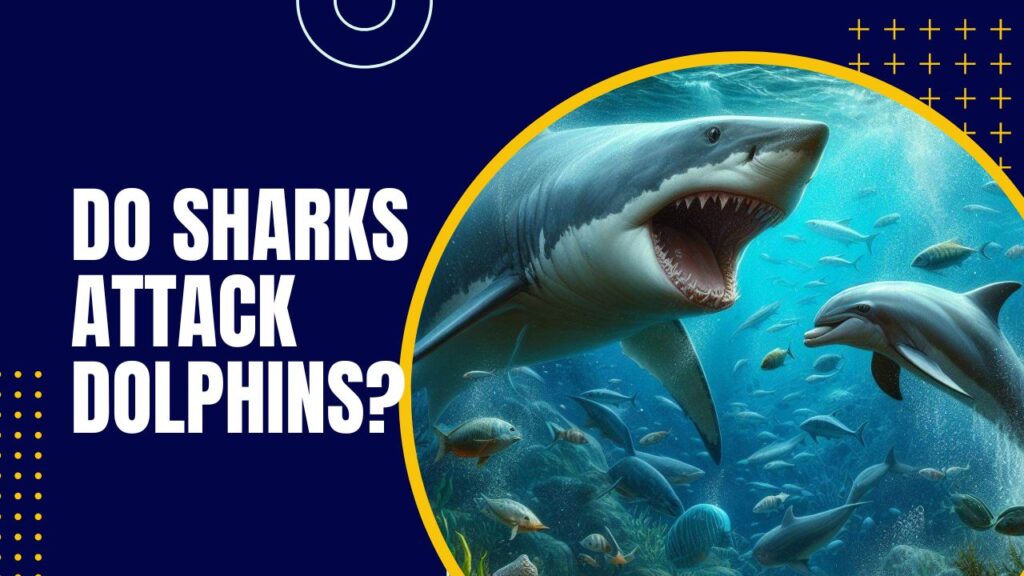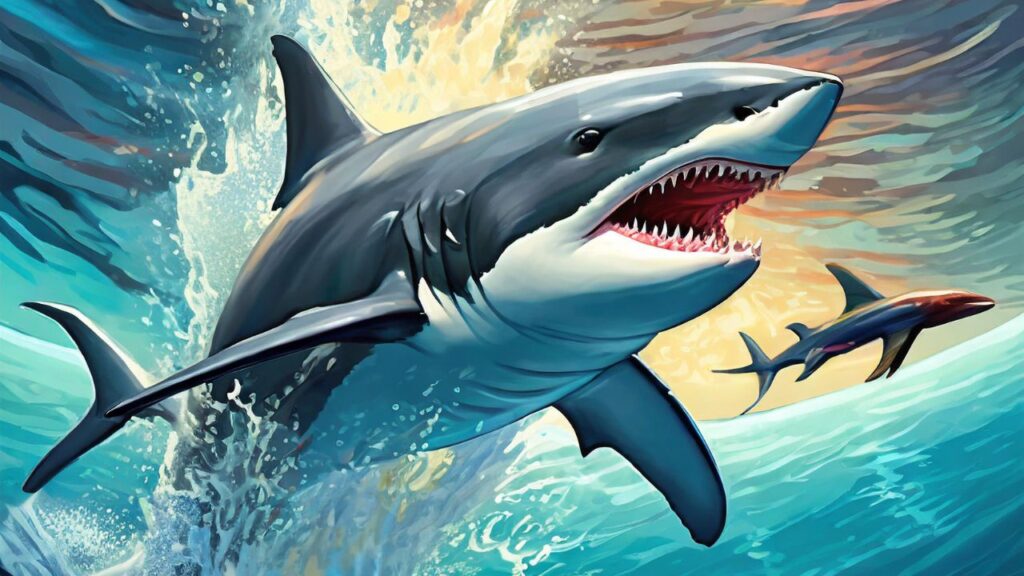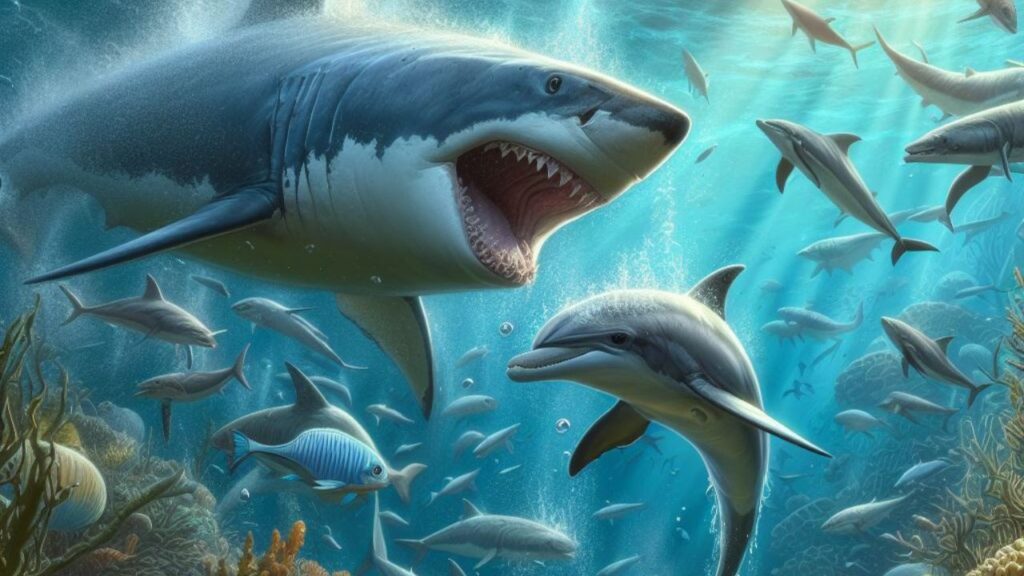Last updated on July 1st, 2024 at 12:15 pm

Are you looking to understand the intriguing dynamics between sharks and dolphins?
Sharks, apex predators with formidable hunting skills, and dolphins, intelligent marine mammals celebrated for their social bonds and agility, inhabit the vast oceans.
Despite their contrasting traits, the interactions between these species, notably shark attacks on dolphins, have fascinated scientists and nature enthusiasts alike.
Do Sharks Attack Dolphins? Yes, sharks do attack dolphins, particularly when they mistake them for prey. However, such attacks are not a common occurrence.
Table of Contents
The Dynamics of Shark-Dolphin Interactions
In the murky depths of the ocean, dolphins’ sleek forms and rapid movements can sometimes be misinterpreted by certain shark species as potential prey.
Factors such as low visibility or heightened hunting activity can exacerbate this confusion, leading to instances of aggression or pursuit.
However, not all encounters between sharks and dolphins end in conflict. Dolphins exhibit remarkable defensive behaviors, such as forming tight-knit pods, to deter potential attackers.
Additionally, their agility and speed serve as valuable assets in evading predators, showcasing their ability to navigate the waters with finesse. [Do Sharks Attack Dolphins?]
| Factors Influencing Interactions | Description |
| Habitat and Distribution | Both sharks and dolphins inhabit diverse marine environments, influencing the frequency and nature of their interactions. Coastal areas with abundant prey or migratory routes may witness more encounters. |
| Species Dynamics | Different shark and dolphin species possess unique behaviors and hunting strategies, impacting the likelihood of interactions. Larger dolphin species, like orcas, may pose challenges to potential attackers, while certain shark species exhibit more predatory tendencies. |
| Prey Availability | The availability of prey resources can influence the dynamics of predator-prey interactions. Competition for food within marine ecosystems may lead sharks to target dolphins as alternative prey sources, particularly when other options are limited. |

Factors Influencing Shark Attacks on Dolphins
Several factors may influence the likelihood of shark attacks on dolphins:
Habitat and Distribution
Sharks and dolphins are two extremely versatile marine animals that live in a wide range of habitats, from open ocean to coastal regions.
Shark and dolphin encounters are naturally more common in regions where their ranges overlap, such as offshore waters or along continental shelves.
Because of their great biodiversity and large numbers of prey, coastal areas are frequently ideal locations for predatory hunting. [Do Sharks Attack Dolphins?]
The spatial distribution of sharks and dolphins can also be influenced by variables like seasonal fluctuations, water temperature, and ocean currents, which further shape the dynamics of their interactions.
Species Dynamics
The risk of shark attacks on dolphins is influenced by the habits, diets, and hunting tactics of various shark and dolphin species.
Some shark species, like bull sharks, tiger sharks, and great whites, are well-known for their ability to hunt and may actively search for dolphins as part of their feeding habits.
On the other hand, dolphins—especially bigger species like orcas, or killer whales—have strong defenses and can be quite difficult for an assailant to overcome.
Shark-dolphin relations can be influenced by the way the unique traits of each species—such as size, agility, and social structure—interact with one another.
Prey Availability
Sharks are opportunistic feeders; they can modify their diets to take advantage of changes in the resources available to prey in their surroundings.
Dolphins are among the other food sources that sharks may hunt when their preferred prey species are unavailable or sparse.
The availability of food resources within marine ecosystems can be influenced by a number of factors, including overfishing, habitat degradation, and natural changes in prey populations. These factors can also have an impact on how frequently sharks attack dolphins.
Sharks may become more predatory due to competition for scarce food supplies, which could put more pressure on dolphin numbers in some places from predation.
See Also: Why Do Dolphins Protect Humans From Sharks?

Conservation Implications
Deciphering the dynamics of shark attacks on dolphins is important for conservation efforts as well as for understanding the intricacies of marine ecosystems.
Dolphins and sharks both serve important roles in keeping marine ecosystems in balance, and disruptions to these relationships can have a domino impact on biodiversity and ecological health.
The long-term survival of sharks, dolphins, and other marine wildlife depends on conservation strategies.
It preserves vulnerable species, maintains vital habitats, and lessens human-caused threats like overfishing and habitat degradation.
See Also: Why Is A Dolphin A Mammal But Not A Shark? Intriguing Science!
Frequently Asked Questions (FAQs)
Are Shark Attacks On Dolphins Common?
Shark attacks on dolphins are rare events in the marine world. While encounters occur, actual predation is infrequent and often stems from mistaken identity or opportunistic hunting.
Why Do Sharks Attack Dolphins?
Sharks may attack dolphins due to mistaken identity or competition for food. Dolphins’ sleek bodies and rapid movements can sometimes be perceived as prey by certain shark species.
How Do Dolphins Defend Themselves Against Sharks?
Dolphins defend themselves by forming tight-knit pods and using their agility. These defensive behaviors help them evade predators and reduce the risk of attack.
Which Shark Species Target Dolphins?
Species like great whites and bull sharks are known to target dolphins. They may prey on dolphins when other food sources are scarce. [Do Sharks Attack Dolphins?]
What Are The Conservation Implications Of Shark Attacks On Dolphins?
Understanding these interactions is vital for marine conservation efforts. Conservation measures must protect both sharks and dolphins to maintain ecosystem balance.
Conclusion: Do Sharks Attack Dolphins?
Finally, studying shark attacks on dolphins, though uncommon, offers valuable insights into the complex dynamics of marine predator-prey interactions.
Through this research, I gain a deeper understanding of the ecological roles played by both sharks and dolphins, empowering you to develop effective conservation strategies for our oceans.
Ultimately, fostering coexistence and harmony between these magnificent marine creatures is crucial for maintaining the rich tapestry of life beneath the waves.

Mr. Das, a certified pharmaceutical scientist, holds a Bachelor of Science in Pharmaceutical Sciences and passionately contributes to dolphin conservation as a member of the committee in Bangladesh.


